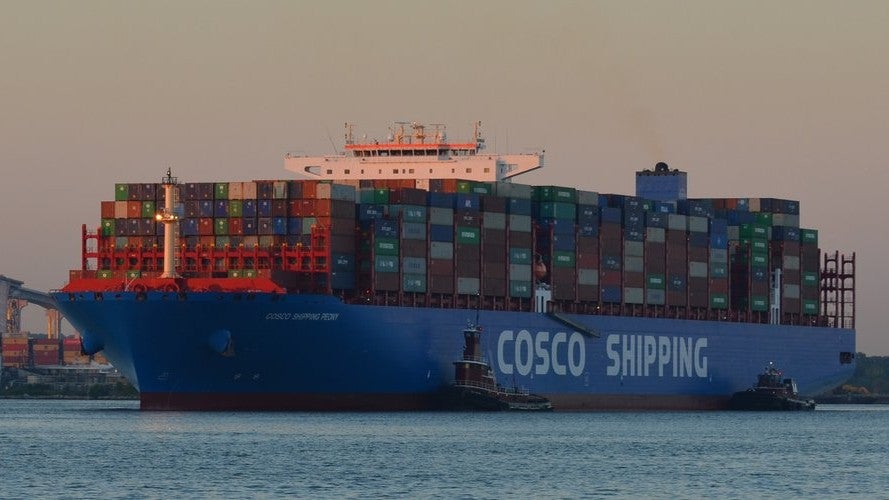
Supply chain analysts and shipping firms have warned of “surging freight rates”, “labour unrest” and “product shortages” around China’s Lunar New Year caused by Yemen’s Houthi militia group’s continued attacks on ships in the Red Sea.
With the Lunar New Year Spring Festival – China’s largest public holiday – beginning on 10 February, the Red Sea conflict is likely to disrupt the flow of goods into Chinese ports, according to Mike DeAngelis, Head of International Solutions at supply chain experts FourKites.
“The crisis hits as China faces its seasonal export surge before factories close for the week-long Chinese New Year holiday,” DeAngelis told Ship Technology. “With fewer vessels available, this rush will strain capacity. Repositioning empty containers back to China has also been disrupted.”
Ocean Network Express, COSCO, Yang Ming and Orient Overseas Container Line are among the shipping companies to have paused or rerouted Red Sea journeys.
All four firms transport high volumes of goods from Europe, North Africa, and the Middle East to the Asia-Pacific region.
European firms including Maersk and Hapag-Lloyd have also suspended Suez Canal-Red Sea routes until further notice.
How well do you really know your competitors?
Access the most comprehensive Company Profiles on the market, powered by GlobalData. Save hours of research. Gain competitive edge.

Thank you!
Your download email will arrive shortly
Not ready to buy yet? Download a free sample
We are confident about the unique quality of our Company Profiles. However, we want you to make the most beneficial decision for your business, so we offer a free sample that you can download by submitting the below form
By GlobalDataA sudden switch to air freight?
Approximately 30% of worldwide container trade has been impacted by the conflict, according to estimates from Goldman Sachs.
Meanwhile, the CEO of Mumbai-headquartered RBB Ship Chartering Raajesh Bhojwani said the attacks have tripled transportation costs, Asian News International reported.
Such disruption has prompted retailers in China and elsewhere to consider other supply options.
“Retailers planning for spring sales events ship goods early enough to avoid any annual delays caused by the Chinese New Year,” DeAngelis said. “If the Red Sea disruption lasts another two to three weeks, there will be product shortages in April and May, except for those higher-end retailers that can afford to shift to air freight.”
Last week, Hong Kong-based carrier Cathay Pacific has faced heavy criticism for cancelling dozens of flights before and during the Lunar New Year Festival – a blow to alternative aviation routes, as Cathay transported 1.15 million tonnes of cargo globally in 2022.
Drought in the Panama Canal brought about by the El Niño weather phenomenon has also forced shipping firms to adapt routes.
Maersk announced a railway “land bridge” to bypass the ongoing restrictions in the Panama Canal.
The Canal’s drought may unintentionally increase ship traffic to East Asia, according to DeAngelis.
“US West Coast shipping prices have also jumped partly due to the crisis limiting Panama Canal traffic,” he added. “The shorter Asia-to-West Coast trip now looks more cost-effective for cargo.”
Houthi attacks persist despite US-UK air strikes
Concerns around the costs and dangers of Red Sea supply routes have deepened following yesterday’s (15 January) ballistic missile attack on the Gibraltar Eagle just south-east of Aden, Yemen.
The Gibraltar Eagle, a Marshall Islands-flagged, US-owned and operated container ship, was “hit from above by a missile”, but the “vessel and crew are safe” according to the UK Maritime Trade Operations (UKMTO).
Since the Houthis’ first attack on 19 November, the number of vessels crossing the Red Sea and Bab al-Mandeb Strait has decreased by 70%, maritime risk analysts Windward told Ship Technology.
Ships are instead circumnavigating the Cape of Good Hope in South Africa, adding one to two weeks in voyage time – and significant cost.
In response to the threat on global supply chains, the US and UK launched a series of joint retaliatory air and naval strikes against Houthi targets on 11 January.
UK Prime Minister Rishi Sunak yesterday (15 January) told MPs in the House of Commons that “all 13 planned targets were destroyed”, before adding that there had been “no evidence so far of civilian casualties”.
Houthi leaders have condemned the air strikes, pledging to continue attacks on Red Sea vessels.
Amid such turmoil, DeAngelis’ advice for shipping firms is to “approach long-term shipping contracts with caution”.
Pointing to “fluctuating freight rates and uncertain transit times”, he said companies should “opt for contracts that offer some degree of flexibility or contingency clauses”.



